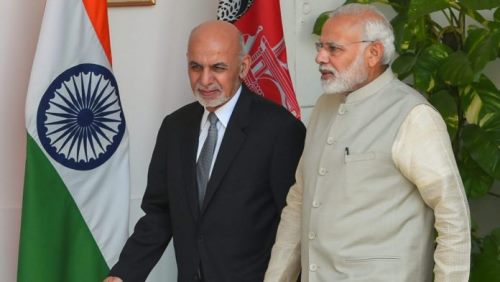The Narendra Modi government is unlikely to change its stance and engage with the Taliban directly as part of the Afghanistan peace talks. While New Delhi has come under pressure from the US to negotiate with Taliban, ThePrint has learnt it will do so “only” under a democratic set-up.
India has always maintained that it is willing to take part in the dialogue process to achieve peace in the war-torn country, but only when the intra-Afghan talks will be Afghan-owned and Afghan-led.
The latest move has come after US Special Representative for Afghanistan Reconciliation Zalmay Khalilzad made a quick tour to India Thursday and met External Affairs Minister S. Jaishankar, National Security Advisor Ajit Doval and Foreign Secretary Harsh V. Shringla, seeking New Delhi’s direct engagement with Taliban on its concerns on terrorism.
Earlier this year, former Afghan president Hamid Karzai had told ThePrint that India should directly speak to the Taliban.
According to top-level sources, India made it clear to Khalilzad — who was also accompanied by Lisa Curtis, senior director in the US National Security Council — that India is willing to speak to the Taliban “only” when it recognizes a democratic set-up, particularly the elected Afghan government.
The U.S. is now pushing India to be part of the talks because it can clearly see that the so-called peace deal, between U.S. and the Taliban leaders, is not panning out the way it was envisaged by the Donald Trump administration, said the sources.
“The talks had a level of urgency,” said a top official, who refused to be identified. The U.S. has asked India to engage itself in the “internal political process of Afghanistan” that would lead to “different formulations accommodating different strands” there, the official added.
So far, India has maintained that if it ever decides to speak to the Taliban, it will only be when the Islamic group refuses to call the Ashraf Ghani-led government as a “puppet regime” as the government in Kabul is the main partner for New Delhi, and becomes part of the pro-democratic forces.
‘Lack of trust’
Speaking to ThePrint, veteran diplomat Gautam Mukhopadhaya said, “It will be difficult for India to talk to the Taliban while the latter put up conditions and obstacles to talks and refuses to recognise the democratic forces that we support. If the U.S. is pushing India to join the process, it is only to ease the process of their exit.
Mukhopadhaya, who was Indian ambassador to Afghanistan from 2010-13, said that the process has not broken down so far with U.S. help, but it “lacks momentum and trust”.
He also said India should be active in the peace process “internally and internationally”. “India may be willing to talk to the Taliban on issues of mutual concern but only as part of an intra-Afghan process, or when it feels that good faith intra-Afghan peace talks look plausible,” he added.
Sources said New Delhi is also upset with the rise in violence in Afghanistan, including terror attacks on minorities like Afghan Hindus and Sikhs, despite the peace deal being signed in February after 18 months of delayed negotiations and nearly two decades of war.
The ball is now in India’s court if it wants to join the talks with Taliban with the U.S. in tow, or when it leaves and the intra-Afghan dialogue begins, said diplomatic sources.
The Ashraf Ghani government has launched the so-called intra-Afghan dialogue with a 21-member team, which will negotiate with the Taliban and discuss the future of Afghanistan after the complete withdrawal of foreign troops from the country.
But it has remained in stalemate since the announcement on 26 March.
“India’s concerns about Pakistan-sponsored terrorism are not met in the US-TB Agreement that provides (weak) guarantees only against ‘international’ terrorist groups like Al Qaeda, for the ‘U.S. and its allies’ who are all far away, and not countries of the region,” Mukhopadhaya said.
“We can best address such concerns when intra-Afghan talks reach a serious stage, not before,” he added.
India’s role in the peace talks remains crucial as it is the largest aid giver to Afghanistan. New Delhi’s development assistance to Kabul has gone up to $3 billion since US forces toppled the Taliban government after the twin tower attacks in New York on 11 September 2001.













